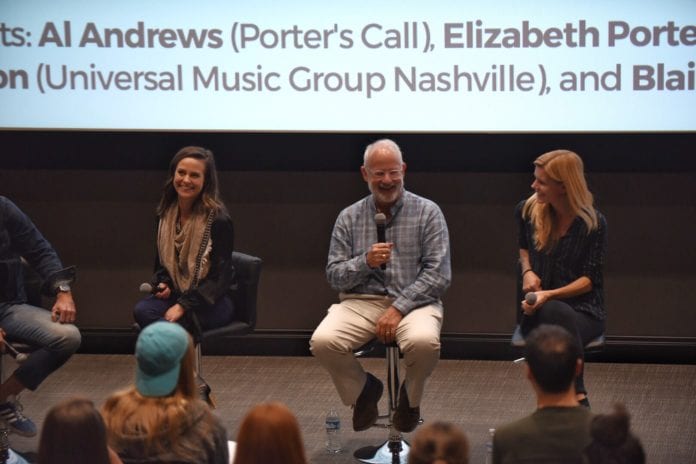Earlier this month a group of local entertainment and mental health professionals shared their experiences on achieving work-life balance and maintaining authentic relationships with Belmont students. The panel, moderated by Belmont’s Senior Career Development Specialist Nina Woodard, was created to delve into the idea of the “entertainment lifestyle” and the challenges that a successful career in the industry may present to students post-grad. The founders of Porter’s Call and Entertainment Health Services, Al Andrews and Elizabeth Porter, respectively, spoke on the panel alongside Blaine Barcus, VP of A&R at Provident Label Group, and Belmont alumna Hannah Wilson, director of A&R at Universal Music Group Nashville.
“In most jobs, there is a start and an end of your day and then you go home. I’ve never known an artist who has ‘finished’ an album, I’ve never known a manager that has been ‘finished,’” explained Andrews, whose Porter’s Call nonprofit was created to guide recording artists in the unique struggles their careers present. “In most jobs in music there is not an ending and a lot of what I deal with is the anxiety that comes with that.”
The panel voiced agreement to Andrews’ observations, adding the fact that this problem of having a never-ending job is what makes work-life balance so difficult to navigate. While the rest of the world operates on a nine-to-five schedule, the music world often only begins in the evenings. Job descriptions don’t include the 3 a.m. calls from an artist or rush to cover a public relations nightmare – but they will inevitably occur, especially in the first jobs students encounter post-grad. That’s why, the panelists said, it is crucial to begin creating boundaries early.
In today’s world, where employees are expected to be accessible at all times, working tirelessly without boundaries puts professional and personal success at risk. “I didn’t have those boundaries,” Porter shared. “I thought I had to work hard and go get it and nobody stopped me and told me: work smarter, not harder.”
For Porter, that means sticking to a firm end-time in her day, where work calls will go unanswered and her focus will be on herself and her family. She also challenged students to evaluate their use of time by putting direct value on it. “Place a $100 bill on every hour of your day and that is your ‘salary.’ See how you spend your time then.”
The panel also unanimously agreed on the importance of something close to students’ hearts – authentic, longstanding relationships. Each panelist shared their own experiences in seeing how crucial hometown and college friends are to the sanity and success of entertainment professionals, on and off-stage.
“The older you get, the harder it is to have the history to build that deep of friendships,” Barcus shared. “In college, you build this depth quickly because of the concentrated time you have together. If you’ve got some good college friends, do everything you can to hang on to those people.”
Written By: Mamie Davis
Photos By: Kenzie Baker



